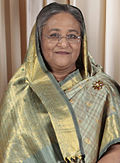
Politics of Bangladesh takes place in a framework of a parliamentary representative democratic republic, whereby the Prime Minister of Bangladesh is the head of government, and of a multi-party system. Executive power is exercised by the government. Legislative power is vested in both the government and parliament. The Constitution of Bangladesh was written in 1972 and has undergone sixteen amendments. The Economist Intelligence Unit has rated Bangladesh as "hybrid regime" in 2016.

The Bangladesh Nationalist Party is one of the two major contemporary political parties of Bangladesh. It was founded on 1 September 1978 by former Bangladesh President Ziaur Rahman after the Presidential election of 1978, with a view to uniting the people with nationalist ideology of the country. Since then, the BNP won the second, fifth, sixth and eighth national elections and two Presidential elections in 1978 and 1981. The party also holds the record of being the largest opposition in the history of parliamentary elections of the country, with 116 seats in the seventh national election of June 1996. It does not currently have representation in parliament after its boycotting of the 2014 national election.

The Bangladesh Awami League, often simply called the Awami League or AL, is one of the two major political parties of Bangladesh.

The Prime Minister of the People's Republic of Bangladesh is the Head of the Government of Bangladesh. The Prime Minister and the Cabinet are collectively accountable for their policies and actions to the Parliament, to their political party and ultimately to the electorate.

Hussain Muhammad Ershad is a former Bangladeshi Army Chief and politician who served as the President of Bangladesh from 1983 to 1990, a time many consider to have been a military dictatorship.
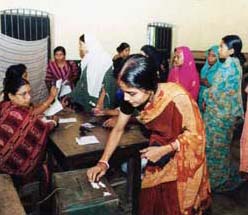
Elections in Bangladesh gives information on election and election results in Bangladesh.

The Fifth National Parliamentary Elections 1991 were held in Bangladesh on 27 February 1991. The result was a victory for the Bangladesh Nationalist Party, which won 140 of the 300 seats. Voter turnout was 55.4%. As a result, BNP leader Khaleda Zia was sworn in as Prime Minister on 20 March.
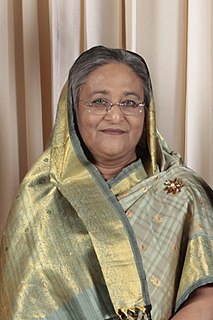
The Seventh National Parliamentary Elections 1996 were held in Bangladesh on 12 June 1996. The result was a victory for the Bangladesh Awami League, which won 146 of the 300 seats, beginning Sheikh Hasina's first-term as Prime Minister. Voter turnout was 75.6%, the highest to date. This election was the second to be held in 1996, following controversial elections held in February a few months earlier.
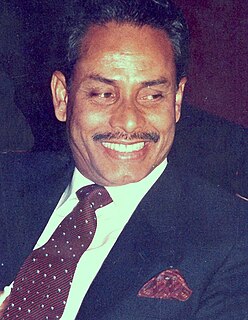
General elections were held in Bangladesh on 3 March 1988. They were boycotted by several major parties, including the Bangladesh Awami League, the Bangladesh Nationalist Party, the Communist Party of Bangladesh, Jamaat-e-Islami Bangladesh, the Bangladesh Krishak Sramik Awami League, the National Awami Party (Muzaffar) and the Workers Party of Bangladesh. The result was a victory for the Jatiya Party, which won 251 of the 300 seats. Voter turnout was 52.5%.
The Sixth National Parliamentary Elections 1996 was held in Bangladesh on 15 February 1996. They were boycotted by most opposition parties, and saw voter turnout drop to just 21%. The result was a victory for the Bangladesh Nationalist Party (BNP), which won 300 of the 300 elected seats. This administration was short lived however, only lasting 12 days before the installation of caretaker government and fresh elections held in June.
The history of Bangladesh after independence begins in 1971 with the independence of Bangladesh from Pakistan.

A referendum on military rule was held in Bangladesh on 21 March 1985 in order to confirm the military rule of Hussain Mohammed Ershad, the Army Chief of Staff who had seized power in 1982. The referendum asked voters "Do you support the policies of President Ershad, and do you want him to continue to run this administration until a civilian government is formed through elections?"

Presidential elections were held in Bangladesh on 15 October 1986. The result was a victory for incumbent Hussain Muhammad Ershad, who had assumed the office in 1983 following a military coup. Ershad reportedly won 84.1% of the vote with a voter turnout of 54.9%. However the elections were controversial as they were boycotted by all major opposition candidates and there were reports of irregularities.
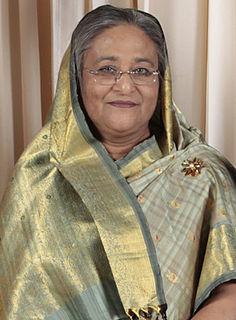
General elections were held in Bangladesh on 5 January 2014, in accordance with the constitutional requirement that the election must take place within the 90-day period before the expiration of the term of the Jatiya Sangshad on 24 January 2014. The elections were controversial, with almost all major opposition parties boycotting and 153 of the total 300 seats being uncontested. Around 21 people were killed on election day.

General elections were held in Bangladesh on 30 December 2018 to elect members of the Jatiya Sangsad. The result was a landslide victory for the Awami League led by Sheikh Hasina. The elections were marred by violence and claims of vote rigging. Opposition leader Kamal Hossain rejected the results, calling it "farcical" and demanding fresh elections to be held under a neutral government. The Bangladesh Election Commission said it would investigate reported vote-rigging allegations from "across the country." The election saw the use of electronic voting machines for the first time.
The 1990 mass uprising was a democratic movement that took place on 4 December and led to the fall of General Hussain Muhammad Ershad in Bangladesh. The uprising was the result of a series of popular protests that started from 10 October 1990 to topple General Ershad who came to power in 1982 by imposing martial law and replaced a democratically elected President through a bloodless coup.

The 1980s was a decade of the Gregorian calendar that began on January 1, 1980, and ended on December 31, 1989. For Bangladesh this decade was characterized by economic hardship, natural disasters and military dictatorship. Hussain Muhammad Ershad ruled Bangladesh almost throughout the decade. Infrastructure development was slow but there was notable progress in local government administration, population control and NGO led microfinance activities which boosted the rural economy. The urge of freedom of speech and return to democracy influenced the cultural activities in the decade.

The 1990s was a decade of the Gregorian calendar that began on January 1, 1990, and ended on December 31, 1999. For Bangladesh this decade was characterized by transition to democracy, rapid urbanisation and globalization and struggle for free and fair elections. The newly earned democracy influenced the cultural activities in the decade.
The National Unity Process is a political initiative in Bangladesh launched by Dr. Kamal Hossain, a long-standing proponent of a period of national unity government for political reform in the country. The initiative has received support from major opposition parties. The aim of the initiative has been to pressure the Awami League government of Prime Minister Sheikh Hasina to hold a free and fair election in December 2018 with the participation of all major political parties. The previous general election in Bangladesh, held in 2014, was boycotted by major opposition parties and was not deemed credible by the United States, the United Kingdom, the European Union and the United Nations.





